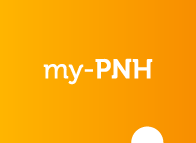You are more than your PNH
Act Now!
More about PNH - what is PNH?
Paroxysmal nocturnal haemoglobinuria, or PNH, is a blood disease that is caused when the cells responsible for making red blood cells (which help to carry oxygen around the body) mutate and produce defective blood cells.1 This triggers the immune system - a sophisticated defence network that keeps the body safe from dangers like disease and infection - to attack and destroy these defective red blood cells, a process called haemolysis.2
PNH is a rare blood disease that can affect anyone of any age, race or gender. No one is born with PNH; it is known as an 'acquired disease', which means it cannot be inherited and it is not contagious.3
Living with PNH
my-PNH.com includes information on PNH symptoms, symptom tracker & PNH support groups and useful tips and advice to help you navigate everyday life or support somebody with the condition.
Helpful resources
View and download a selection of resources, including a symptom tracker and a booklet, as well as links to patient organisations for support.
Body and mind
How do you feel? Do you find that you often feel physically and mentally exhausted? Sometimes, certain lifestyle changes may have a positive impact on your physical and emotional health.4
Navigating work, family, and everyday life
PNH can make many aspects of daily life challenging. View some tips that may help you manage your condition.
Talking about your PNH
Do you sometimes find it difficult to talk about your PNH with those around you? View helpful tips on communicating your condition effectively.
References:
1. Britannica. Hemolysis. Available at: https://www.britannica.com/science/hemolysis [Last accessed: August 2022]
2. Barcellini W and Fattizzo B. Clinical Applications of Hemolytic Markers in the Differential Diagnosis and Management of Hemolytic Anemia. Dis Markers 2015;635670.
3. Devos T, et al. Diagnosis and management of PNH: Review and recommendations from a Belgian expert panel. Eur J Haematol 2018;101:737–749.
4. AAMDS International Foundation. Caring for Yourself. Available at: https://www.aamds.org/treatments/self-care. [Last accessed: May 2022].



